Boilers for heating a private house: types, features + how to choose the best
Properly choosing boilers for heating a private home is necessary for installing an autonomous system.It is heating equipment that will provide housing with heat and hot water. It will create the microclimate necessary for human habitation. In addition, it will work flawlessly. It is so?
We will tell you how to buy a boiler that will meet your requirements and wishes. We have analyzed all the criteria that you should pay attention to when looking through catalogs of online stores or an assortment of specialized retail outlets. Problems that you may encounter before and after purchase are listed.
The content of the article:
Basic criteria for choosing boilers
Hundreds of foreign and domestic manufacturers offer thousands of models of heating equipment. It is not easy for an unprepared buyer to navigate all this variety of products. I want it to be cheaper and the quality to be high.
All heating boilers differ in the type of fuel and are divided into the following categories:
- solid fuel (processing firewood, peat, pellets, coal);
- liquid fuel (units running on diesel fuel);
- gas (regular and condensation);
- electric (requiring electricity supply);
- universal (using either gas or electricity).
Before choosing an option, it would be a good idea to do a little analysis and find out which energy carrier is profitable to use in your region. Then you need to decide how safe, reliable and comfortable the boiler should be in terms of every penny invested in it.
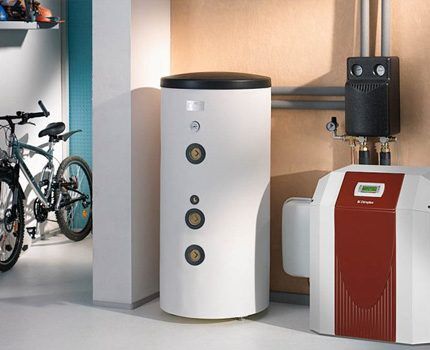
In order not to make a mistake and not waste your hard-earned money, you need to carefully consider the process of choosing equipment. To do this, it is necessary to take into account a number of nuances that significantly affect the final result.
When choosing a boiler you should:
- understand in detail the advantages and disadvantages of each type of boiler;
- calculate the optimal heating power for your home;
- decide on the number of circuits;
- choose the location where the equipment will subsequently be placed.
The maximum permissible dimensions and weight depend on the future location of the boiler. After all, for a small room it is not advisable to choose a heavy cast-iron unit.
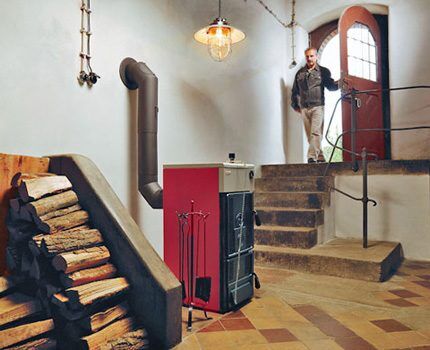
Rules for calculating equipment power
It’s worth remembering right away that the desire to save money on designing a heating system and performing thermal calculations in most cases backfires on the customer. If you think through everything carefully and trust a highly qualified specialist, then the cost of the boiler, radiators and other equipment will be much cheaper.
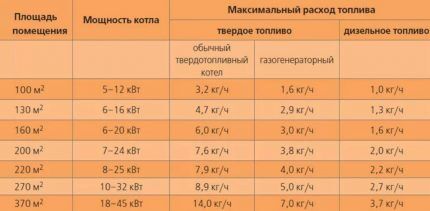
To approximate the power of heating equipment required to heat a building and provide hot water supply, you can use special design standards.
It is also imperative to take into account:
- the number of people who will live in the house;
- building materials used for housing construction;
- climate zone;
- number of windows and doors;
- number of floors and other factors.
The opinion that the boiler power is selected at the rate of 0.1 kW per square meter is quite common. But thanks to modern building materials and innovative engineering equipment, heat losses can be significantly lower and, accordingly, the performance of heating equipment can be higher.
Characteristics of the main types of boilers
All boiler models offered on the market differ not only in appearance and cost, but also in the fuel used to operate it. They can be divided into separate categories depending on the type of fuel material.
In addition, the energy carrier that will be used to heat water in the heating system plays a big role. It directly affects the efficiency of the boiler, energy efficiency and ease of operation.
1. Useful qualities of solid fuel boilers
In the CIS countries, solid fuel is considered the most accessible and cheapest. This explains the popularity of equipment that uses this type of energy carrier in its operation.
It should be remembered that in solid fuel boiler You can’t burn everything that burns.It is necessary to use only the energy carrier for which the equipment was designed.
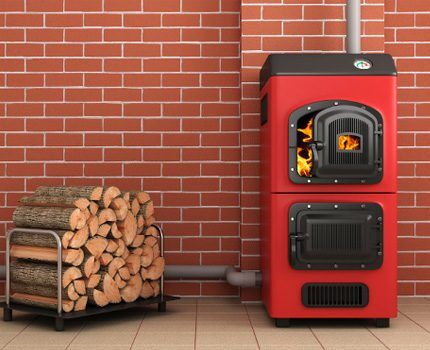
The list of advantages of solid fuel heating equipment should include:
- autonomy;
- good energy efficiency. The efficiency of such boilers approaches that of devices running on fossil fuels (gas, diesel, etc.);
- low energy prices.
When buying solid fuel units, you need to understand that from time to time you will have to add firewood to the boiler. That is, every 6-18 hours it is necessary to fill the boiler with wood fuel or waste from wood processing production structures.
Although today there are systems that boast automated laying of logs or wood chips, this kind of equipment is mostly intended for enterprises working in the woodworking industry, and not for private houses and cottages.
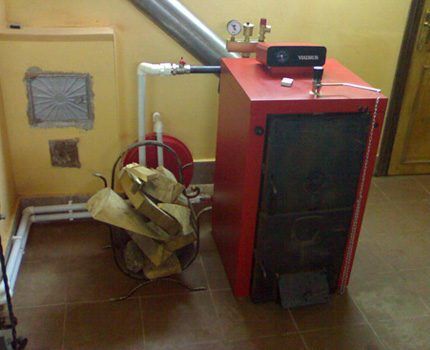
2. Operating principle of pellet boilers
Pellets or wood pellets are wood waste compressed into a small cylinder. For example, it could be shavings or sawdust from softwood.
The product is formed without any additional additives or glue; only a pressure of about 300 atmospheres is applied. The diameter of the granules is usually 6-10 mm, and the length is 10-30 mm.
Main advantage pellet boilers lies in their autonomous mode of operation. Nowadays, you can easily find equipment with a small bunker, where there is a screw supply of fuel pellets. On average, supplies last for several days.
Often, in order to increase the period of autonomous operation of equipment, another small bunker of a couple of cubic meters is organized in the basement or some outdoor room. From such rooms, fuel pellets are supplied to the bunker and then directly to the boiler.
The operating life of such a system can reach one month. As for the efficiency, pellet boilers can boast much greater efficiency than conventional and even pyrolysis devices.
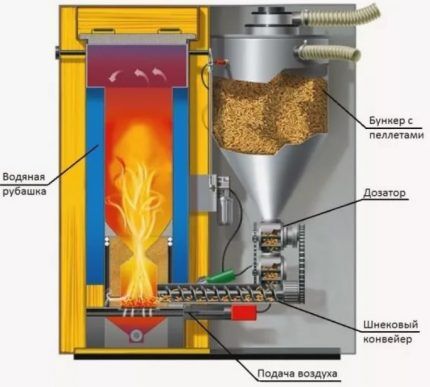
The disadvantage of such heating equipment is the design complexity of the equipment. Because of this, the pellet boiler is sensitive to the quality of the fuel. In order for the unit to last a long time and to avoid any problems during its operation, it is necessary to use class A or B fuel pellets, which were manufactured by foreign manufacturers.
Another disadvantage of pellet boilers, which prevents their popularization in the domestic market, is their high cost. On average, the price of such devices starts from $2,200.
The installation of a pellet boiler must be carried out taking into account the following requirements:
3. Pros and cons of liquid fuel boilers
Liquid fuel boilers are considered simple and reliable equipment that, with proper care, will last for decades.They are purchased for installation in country houses and private homes.
The main advantages of this category of boilers:
- no dependence of the equipment on the gas main;
- ease of equipment installation;
- no need to obtain any permits to install the boiler;
- fairly high energy efficiency indicators;
- Some models of diesel boilers can be adapted to operate on gas.
In addition to such obvious advantages, the equipment has certain disadvantages, one of which is the need to heat the fuel line in winter so that the temperature of the energy carrier does not drop below +5 degrees Celsius.
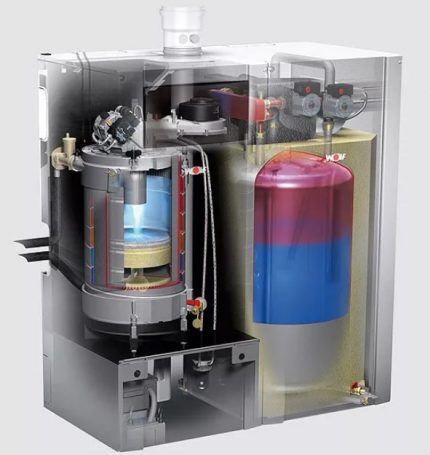
Also, the disadvantages of liquid fuel heating equipment include:
- mandatory presence of a compartment designed for fuel storage:
- the equipment creates quite a lot of noise due to the constantly working burner;
- the need to periodically supply high-quality liquid fuel;
- unpleasant odor from the fuel bunker;
- quite high operating costs.
Even despite the large list of disadvantages, liquid fuel equipment is in demand among dacha owners. Especially if access to other energy resources is limited in the area.
4. The feasibility of purchasing electric boilers
Electric boilers are often installed when the village under construction is not yet equipped with a full-fledged gas network. But subsequently, such units are replaced with gas ones.This use of heating equipment accounts for about a quarter of all sales electric boilers.
The most common models, whose power is 5-10 kW, can maintain a temperature of about 6 degrees Celsius when it is -20 outside. This is quite enough to continue finishing work in a newly built house.
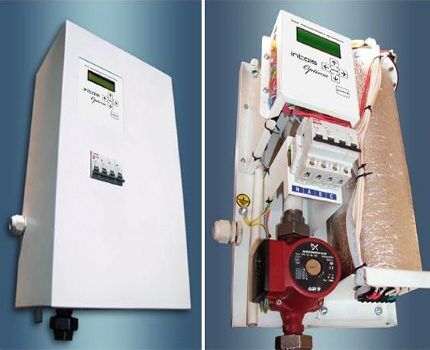
Distinctive features of electric boilers are the low cost of equipment, ease of installation, small dimensions, lightness, lack of open flame, ease of maintenance and no need to organize a separate room for the unit.
When purchasing such heating equipment, you need to remember the high cost of electricity, the need to connect high-power devices to a three-phase network, and the sensitivity of the device to power outages.
5. Characteristics of gas equipment
If we compare gas-fired boilers with all other types of heating equipment, then this type is the best choice for most consumers.
After all, gas units are more economical and easier to operate. Such equipment does not require special care, and the process of their operation is fully automated. And you don’t need to store fuel.
If you are planning to install a floor or wall-mounted gas boiler, you need to know that before installing such equipment you need to obtain the appropriate permit. The certificate is issued by the state regulatory authority.
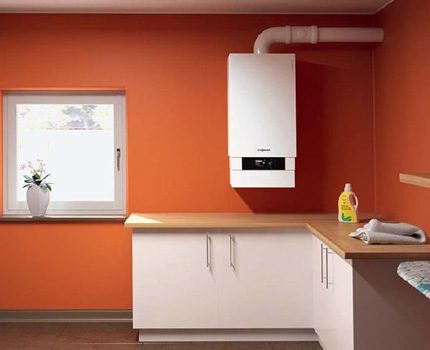
The disadvantages of this type of heating floor type equipment should include the need to install automation that will shut off the gas pipeline in the event of an energy leak or insufficient ventilation. Also, due to seasonal pressure surges, equipment may fail and require repair.
Although the cost of gas is not too high now, the energy carrier is a fossil fuel. This means that its value could likely increase over time. Therefore, manufacturers are trying to adapt gas type boilers to operate on biogas fuel.
For example, on the modern market there are models of equipment that operate without problems on a mixture where about 15% is biogas.
6. How effective are universal boilers?
The main advantage of universal heating systems is their convenience. Most often they are installed in those cottage villages where there is no permanent gas supply. People are forced to somehow get out, so they use the gas tank method, the essence of which is to heat the house with liquefied gas.
After the settlement is supplied with a sufficient amount of this energy carrier, the boilers are switched to its use.
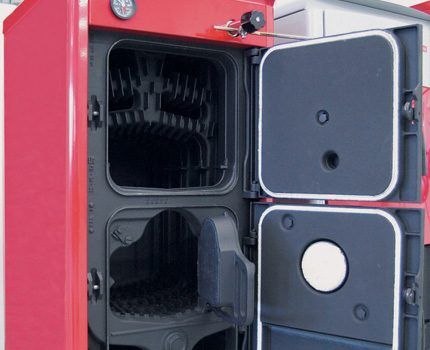
The heating equipment market offers a wide variety of boiler models, using several types of fuel in their work. A striking example is a system that can burn both gas and liquid fuel.
Its advantage is that, regardless of the type of energy carrier currently used, the thermal output of the boiler will remain virtually unchanged.
Features of single- and double-circuit boilers
When thinking about how to choose the right heating boiler for your home, special attention should be paid to such a characteristic as the number of circuits. Single-circuit technology is intended exclusively for heating the coolant circulating through heating pipes.
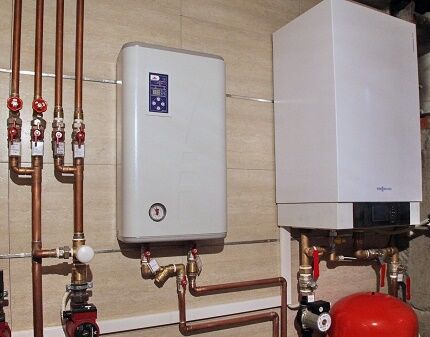
In this case, to heat tap water you will have to additionally install a boiler. Yes, a single-circuit boiler is convenient, but the disadvantage of this solution is its high cost - you will have to buy not only heating equipment, but also a boiler. Moreover, both devices will take up a lot of space.
Concerning double-circuit boiler, then here the heating equipment and water heater are assembled into a single structure. Thanks to this structure, you can solve two problems at once, while purchasing only one unit.
In addition, in the absence of hot water, the coolant can be redirected to the second circuit and used alternately - to heat the house and to provide hot water supply.
Operating principle of single-circuit equipment
Single-circuit heating equipment is most often used by owners of luxury country houses.In essence, a single-circuit boiler is the same water heater, but supplies water to the heating system.
The operating principle of this type of equipment is based on burning fuel in a special compartment and heating the liquid. The heating main is connected to the outlet where the hot coolant enters. Next, the water begins to circulate through the pipes and heat the rooms.
The final stage of circulation is the arrival of waste coolant back to the boiler through the inlet pipe.
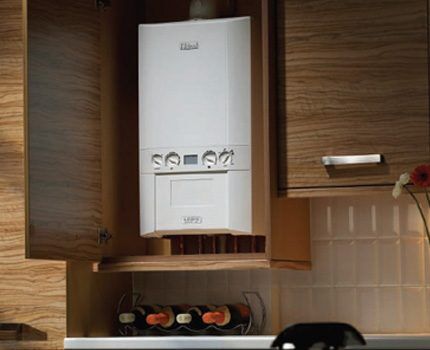
The cost of a single-circuit boiler may be more than a double-circuit system. Even despite less functionality, this type of equipment is less expensive to install, easier to operate and more energy efficient.
Single-circuit equipment is suitable for those buyers who want to spend money once and buy reliable equipment that does not require special care. This type of boiler will be the ideal and only right choice when there is no need for hot water supply in the house.
Design specifics of a dual-circuit unit
A double-circuit boiler is a system where, in addition to the primary heat exchanger, there is an additional one designed to heat water and then supply it to the water supply system. The movement of the coolant is controlled using a three-way valve. It directs the heated water either to the DHW circuit or to the heating system.
It should be noted that in the first case, the coolant will be supplied only if the hot water tap has been opened.The peculiarity of such heating equipment is that while the tap responsible for supplying hot water is open, the system does not work.
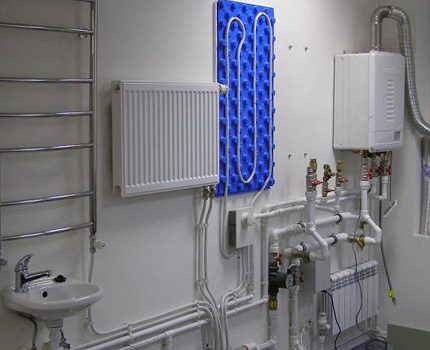
The disadvantages of the double-circuit boiler design include the need for careful and attentive maintenance. This is due to the fact that the secondary heat exchanger can become overgrown due to the use of water containing organic and mineral particles suspended in it, and the small diameter of the pipes.
If you plan to actively consume hot water, then installing a double-circuit boiler is not the best solution. After all, then the house will not be heated well. You should only think about installing this system in a small house or apartment, where there is not enough space to organize a full-fledged boiler room.
Selecting a location for heating equipment
All types of heating boilers are produced mainly in a floor-standing version, electric in a wall-mounted version, and gas in both a wall-mounted and a floor-mounted version. The latest variation is best installed in a spacious separate room. Such heating equipment is characterized by great power and massiveness.
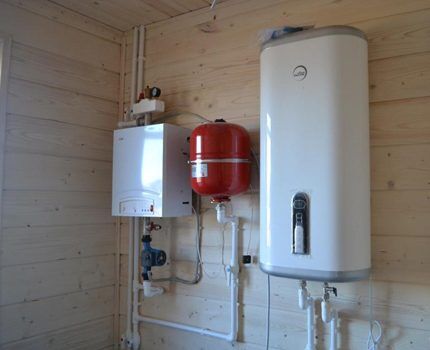
And due to the fact that the weight of floor-standing boilers is not limited in any way, manufacturers install a cast-iron heat exchanger in it, which is much more reliable than a steel one.
Wall-mounted heating equipment is compact in size and fairly light in weight. But this type of boiler is limited in power.This minus is especially relevant for dual-circuit systems - the performance of the heating circuits will be quite low.
You should choose wall-mounted boilers only if the heated area does not exceed 200 m2, and hot water consumption is no more than 14 l/min. If the needs are greater, then it is better to give preference to the floor-mounted variation of heating equipment.
It should be noted that many buyers, regardless of the size of their living space, prefer floor-mounted systems that are equipped with a cast-iron heat exchanger. After all, such devices are less demanding on the quality of power supply.
Subtleties of using boilers
The vast majority of boiler models require electricity to function properly. The only exception is solid fuel heating equipment that burns coal or wood. Such devices can work autonomously.
Why is electricity needed? Current is required for the operation of the boiler system automation and its pumps. Therefore, a good solution would be to order an electric generator along with the heating equipment. This solution is especially relevant for those regions where the power is often turned off.
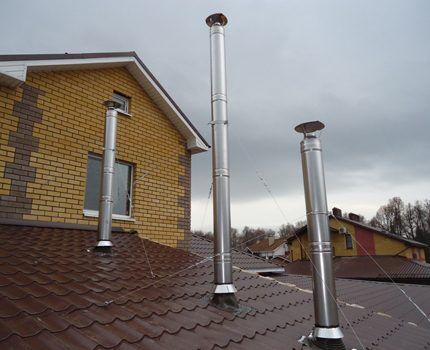
Regardless of the type of boiler used, the manufacturer does everything possible to ensure that the operation of its equipment is as safe as possible.
Therefore, almost any modern model of heating equipment is equipped with the following protection systems:
- sensor that detects the presence or absence of flame;
- traction control sensor;
- a device that will stop the operation of the boiler if the pressure in the gas pipeline drops below the permissible level;
- a device that turns off the boiler in the event of a lack of electricity;
- a system that protects equipment from overheating;
- a sensor that stops the operation of heating equipment in the event of a decrease in the volume of coolant.
All the details listed above are the bare minimum that will protect the boiler from breakdowns and the home itself from fire.
As for the location of the equipment, certain models of boilers, the boiler power does not exceed 100 kW, can be installed directly in the kitchen.
Other types of heating equipment must be placed in specially equipped room a certain cubic capacity, with a thoughtful and well-designed ventilation system, with fire safety devices, etc.
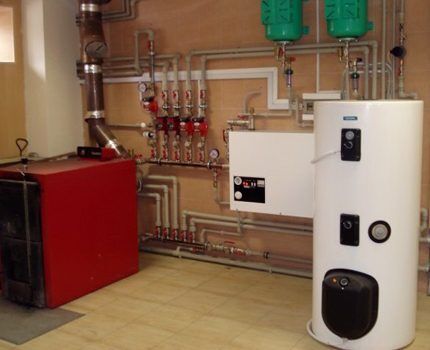
The most commonly used boilers in the CIS countries at present are gas boilers. This demand is explained by the low cost of this energy carrier, as well as the reliability and durability of boilers of this type. But due to regional characteristics, gas heating equipment is not always the most optimal and profitable solution.
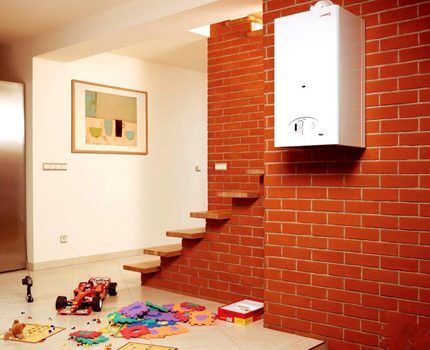
Economical fuel consumption and reduction in equipment maintenance costs are an important component of choosing the optimal unit for an independent heating system. Organization rules energy saving heating are given in our recommended article.
Conclusions and useful video on the topic
Features of choosing boilers are discussed in the video clip:
The most common mistakes in choosing heating boilers are shown in the video:
This video tells about long-burning stoves:
To decide which boiler is best to choose for a private home, you need to consider in detail all the positive and negative aspects of each type of heating equipment.
If you spend a little time, conduct a simple analysis of fuel availability, correctly calculate the power and take a responsible approach to installing the system, you can not only make your home warm, but also save on heating it.
Would you like to share interesting facts about the choice of boilers for autonomous heating devices? Do you have any questions while reading the information we offer? Please write comments in the block below and post thematic photographs.
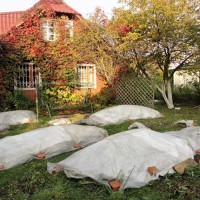


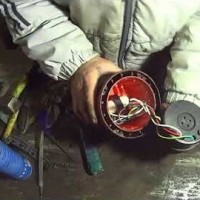
I can only say from my own experience that no matter how you calculate the power of the boiler (I’m talking about a gas boiler), it is always better to take it with a reserve. Because in fact it often happens that not everything has been taken into account, or the winter is severe and the house is cold. They themselves changed it a year ago to a more powerful one, since the previous one, although it was in good working order, did not provide the desired temperature in the rooms in severe frost. But, of course, it consumes a lot of gas, and heat is expensive.
Hello. Thanks for sharing. I'll tell you about my experience. We have an electric boiler, but, in principle, the only difference is the type of fuel. The house is relatively small, 43 square meters. Heated at a power of 4 kW. In the summer, the floors were completely redone, the outside walls and slopes were insulated.They installed good doors. As a result, the next winter the heating was already at 2 kW, even in severe frosts. So a lot depends on the insulation of the house.
Good article! It says that solid fuel boilers burn for 6-18 hours. Our long-burning wood-burning strap burns for 24 hours. On coal for at least 4-5 days. Constantly adding firewood to the boiler of the day is now a thing of the past; we keep it mainly for the barbecue. There are different types of solid fuel boilers; it is best to buy universal ones that are not tied to a specific type of fuel. Prices for it change, so sometimes we buy coal, and sometimes pellets.
When I was choosing heating for my home, I took a long time to decide. True, I immediately ruled out gas - we don’t have a main line, and you can’t stock up on cylinders (and it’s unsafe, in my opinion). Electricity was expensive, so I bought a Stropuva long-burning solid fuel boiler. A very good option, mine can run on both coal and wood. I usually heat it with coal, and it burns for about 3-4 days from one stash.
I also settled on pellet production, bought Dozatekh. I thought, reflected, and calculated everything for a long time. And it was this 20 kW boiler that turned out to be the cheapest for me to install and heat my house. The efficiency is high due to 5 lines in the heat exchanger, the pellet receiver is large. The steel is thick, everything is done conscientiously, it will definitely not burn out. Well, the first winter showed that I really wasn’t mistaken.
An interesting texture, but I still haven’t found the answer to my question.
I have a frame house in the country. One and a half stories high. Walls 15 cm. Floors 20 cm. Area of each floor 35 sq.m.
Since the house is small, I want to have a separate boiler room using solid fuel - wood or coal.Exclusively for home heating. I don't need hot water.
There is no well, and the local water supply is highly ferrous. This means the boiler is only for heating the house. There are also power outages. I would like complete autonomy. Which boiler should I choose? What room is suitable for it? And how far from home? Could it be a small metal container? Thank you.
Regarding power outages, I can recommend using a gasoline electric generator if there are outages. This is when installing a boiler with automation and electronic control, which requires a network connection.
There are solid fuel boilers with mechanical control; they do not require connection to the electrical network. For example, a solid fuel boiler MAXITERM 12P, the efficiency of which is 80%, and firewood, peat briquettes/peat and coal are used as fuel. It operates up to 6 hours in autonomous mode from one load of solid fuel. I think that for your case this is the best option. The heating area is up to 120 m2, which means there is plenty for your house. Please note that the minimum height of the chimney must be at least 7m.
Are there heating boilers that do not require constant human presence and attention? So that you can turn on the heating in the house and leave for a month or two?
Hello. The perpetual motion machine has not yet been invented and problems can arise with any boiler. But in general, most modern automatic boilers have a system for extinguishing the burner in an emergency and turning it on/restarting when the system resumes operation.Plus there are boilers that can be controlled using the “smart House” remotely. Still, when leaving, I advise you to leave someone to look after the heating system.
If you need a fully automatic boiler for heating, then there are only two options to consider: gas and electric. The latter option will be preferable, since you need to leave the boiler in autonomous mode for 1-2 months.
For example, I can recommend the Bosch Tronic 5000 H 45kW electric boiler in combination with a digital room thermostat Vaillant VRC 370 0020108147. For clarity, I have attached a photo of the thermostat; with its help you program the boiler to operate in a certain mode for a specific period. That is, you set the temperature to 18*C, for example, you don’t need more if there is no one at home. Then the thermostat controls the temperature, sending commands to the boiler so that it maintains the set temperature.
I installed a boiler in my house, at first everything was fine. When HUGE electricity bills started coming in, I decided to look for ways to save money. I looked through different thematic channels on YouTube and found out all the possible options. As a result, I chose the Rustesla company (there are all the video instructions). I contacted them and they provided me with quality advice and solved my problem.